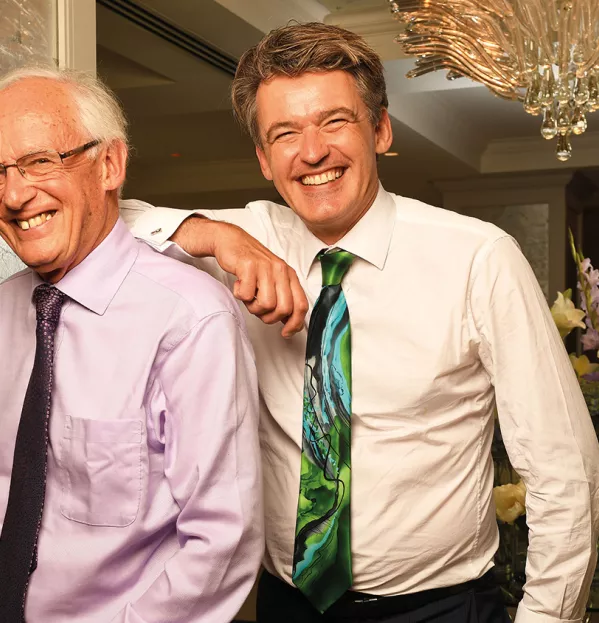Relatively speaking, these big guns see eye to eye on FE’s future

When Mark Dawe was head of corporate services at Canterbury College in 1996, he was none too pleased to get a letter from the government ending the glorious years of ever-increasing further education expenditure.
To add insult to injury, the letter Mark stared at in amazement was signed by none other than his father, Roger Dawe, who just happened to be director general for FE and higher education at the Department for Education.
Two years earlier, funding chiefs had come up with the “demand-led element” (DLE) to provide unlimited expansion for cost-efficient colleges. The cap on student numbers was removed for colleges able to recruit students beyond agreed targets at half the cost.
However, college use of the DLE was too successful, pushing the fund close to “bankruptcy” and provoking Treasury officials to pull the plug without warning. Not that Mark blames his dad for the fiasco. As Roger told Tes earlier this month: “No chance there of me changing the policy, as the Treasury were not too keen on the flow of money involved.”
And now, 20 years later, as post-crash austerity cuts do their worst, we find the two Dawes still in key positions of influence. Only now, they are definitely singing from the same hymn sheet: Mark, as chief executive of the Association of Employment and Learning Providers, and Roger as the newly appointed chairman of the Careers Colleges Trust.
Mark is again grappling with funding chiefs over the “disastrous implementation of the apprenticeship employer levy” that left hundreds of top-rank providers without the cash to pay for apprentices on their books. Meanwhile, Roger is attempting to help turn around an area that arguably has suffered most from the unintended consequences of ill-thought-out government education policy: careers.
Given that all fathers and sons fall out, what is the secret of their harmonious relationship? It could be the way Mark was brought up, suggests Roger, who says proudly that he raised his son, “in a spirit of benign neglect”.
Dual quests
During Mark’s infancy, Roger was private secretary to prime minister Harold Wilson and in the boy’s teenage years, in the 1980s, Roger spent seven years commuting to Sheffield, where he worked with the Manpower Services Commission. In this role, he had considerable influence over the reshaping of FE in advance of college incorporation in 1993, “so my wife bore the brunt of child and teenager rearing”, he says.
There was, however, the odd less-than-cordial moment on the domestic front. Roger says: “I do recall some differences of opinion, certainly on volume, when he used our dining room for rehearsals with a heavy metal-style group in which he was involved.”
Comparing views in a joint interview with Tes, the two are in total agreement on everything from the shortcomings of employer levy implementation and the need to get a sharper focus on careers, to ill-considered government policies on education - not least under the 2010-15 coalition - that they say have, too often, marginalised vocational learning.
The apprenticeship levy on employers has been fudged, they both argue. Where big employers are paying, Mark says, the £2.5 billion promised offers amazing opportunities, “particularly at HE and degree level”.
However, for small companies and others not subject to the levy, there is a £1 billion shortfall. Given that the independent training providers do 75 per cent of training for employers, it’s left hundreds rudderless. Colleges are also hit, since 40 per cent of their apprenticeship work is sub-contracted to independent providers.
“Typically,” says Mark, “last week I had one provider coming to me almost in tears as she had 14 sub-contractors and 200 apprentices ready to start, and no money.”
“What message does this send to young people considering an apprenticeship?” asks Roger. The Career Colleges Trust was created to promote careers in a particular industry through core academic elements and practical vocational and technical education in FE. It’s difficult, he insists, when DfE messages focus overwhelmingly on academic study.

Roger is particularly concerned about repercussions of policies that put schools in the lead when it comes to careers advice. “Giving schools responsibility for careers is giving one of the interested parties an upper hand.”
Mark shares the concern and notes how rarely schools invite employers and independent training providers to spell out the alternatives to A levels. “Rather than bringing in shiny-suited people, they should have employers and providers explain to young people the benefits of apprenticeships,” he says.
This happens in the best areas, they agree. Roger recently stepped down as chair of governors for Bromley College. In Bromley, schools and colleges specialise across the A-level and vocational range in co-operation with employers - a model that should be extended across the south bank of the Thames with the creation of the multi-campus London and South East Colleges.
For this to really work, however, far-reaching policy changes are needed, says Mark. “The DfE approach does not see the move from school to college as progressive. That came about because of the emphasis on academic progression. As a result, BTEC had 40 per cent synoptic assessment added to it and that’s kicked out 14-16 vocational education.”
According to Roger, “that’s where careers colleges are trying to get in. UTCs should have been enabling FE colleges by getting engaged in the FE agenda. But there was a drive to make sure they were not part of FE.” The interventionist hand of Gove in the market, again.
Mark insists: “Until you change the whole system of recruiting at 14, it won’t work.” On this he says there has been a major step back in recent years, citing his experience as principal of Oaklands College, in Hertfordshire. “When I was a college principal, the Increased Flexibility Programme released school pupils a day a week for college, which motivated them to do vocational study. We have 11 million adults without functional literacy and numeracy and we need another Skills for Life programme. It worked well and it has been dropped.”
There is one thing over which father and son will never fall out: they are unequivocal Plymouth Argyle football supporters. “We always support the underdogs,” Roger quips, referring to FE and skills as well as their team.
Given Plymouth’s promotion to League One this season, surely the auspices for FE could not be better.
Ian Nash is a journalist, author and media consultant, and former assistant editor of Tes
You need a Tes subscription to read this article
Subscribe now to read this article and get other subscriber-only content:
- Unlimited access to all Tes magazine content
- Exclusive subscriber-only stories
- Award-winning email newsletters
Already a subscriber? Log in
You need a subscription to read this article
Subscribe now to read this article and get other subscriber-only content, including:
- Unlimited access to all Tes magazine content
- Exclusive subscriber-only stories
- Award-winning email newsletters